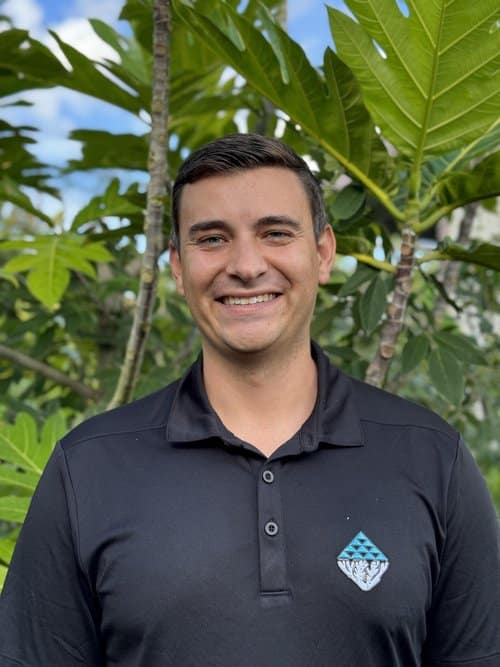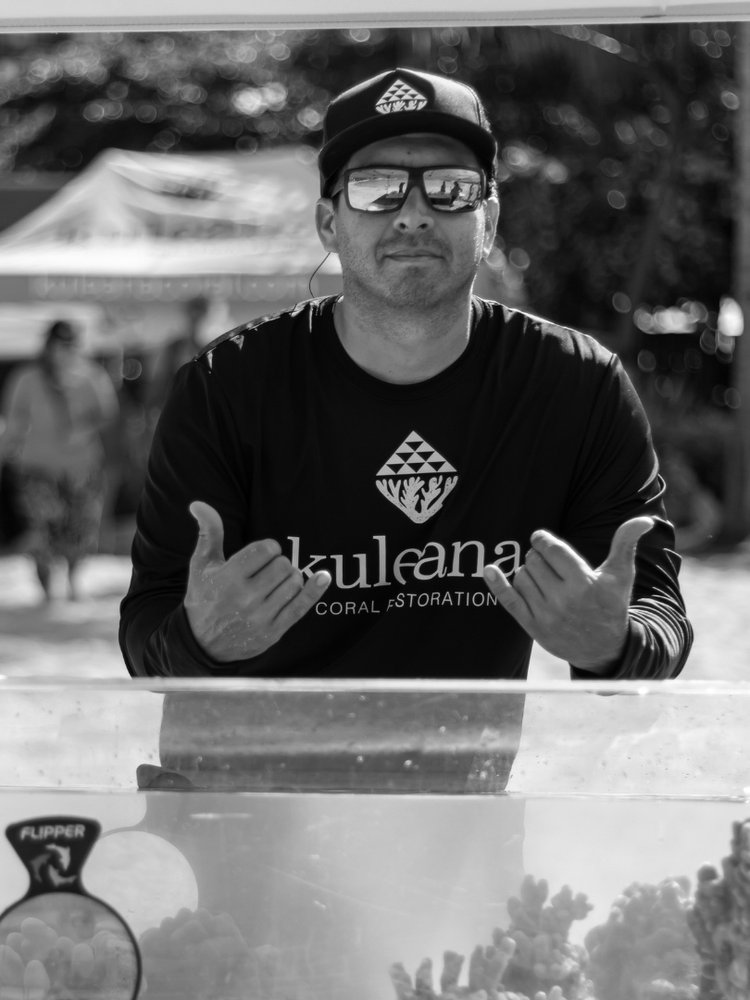
Susan Ching (Botany) has a background in botanical sciences with a focus on ecology, evolution, and conservation biology of rare Hawaiian native plant species. She has been working in this field on Oʻahu for the past 20 years. She will contribute to this project as a botanical resource for all common and rare native species as well as non-native and Polynesian introduced species. Her input will be used to help make decisions on priority weeds to remove or native species care.

Eric Dilley (Marine Biology) is a marine biologist working with the Aquatic Invasive Species (AIS) team at the State of Hawaiʻi Division of Aquatic Resources (DAR). He previously worked on managing invasive seaweed through biocontrol with native wana (urchins) and monitoring coral outplants from DAR’s Hawaiʻi Coral Restoration Nursery. Eric is currently working on DAR rapid response planning for coral disease, coral bleaching, AIS, and emergency coral restoration. In 2023, Eric began working with the Honokai Hale community group Ka‘uikiokapō/Hoʻōla Hāniʻo providing support and expertise on coral reef habitat characterization and coral restoration in the native Hawaiian fishery of Hāniʻo as a DAR representative. His passion for community engagement, native Hawaiian culture, and coral reef restoration fuels his dedication to Ka‘uikiokapō/Hoʻōla Hāniʻo and its efforts to foster the connection of the Honokai Hale community to the land through biocultural restoration and aloha ʻāina.

Kari Noe (Data Sciences and ‘Ike Hawai‘i) is a computer scientist and a center director at the University of Hawai’i Office of Indigenous Knowledge and Innovation (OIKI). She received a PhD in Computer Science from the University of Hawai’i at Mānoa with a focus on data visualization and XR interaction design. She currently is the director of the Center for Indigenous Innovation in Data and Emerging Technology (CII-DET) at OIKI. She is based out of the Create(x) Emerging Media Lab at the University of Hawai’i West O’ahu where she manages the Indigenous Data Hub program, a program focused on developing infrastructure and programming for place-based data-centered applied research and workforce development.

Blake Nowack (Coral Restoration) is a marine biologist and Restoration Manager for Kuleana Coral Restoration. He obtained his bachelor’s degree from Hawai’i Pacific University, and has a diverse background in coral propagation/husbandry, aquaculture, the marine tourism industry, and underwater photography. In his current position, he works closely with a variety of partners and community groups on collaborative restoration efforts utilizing a holistic framework termed Community Based Coral Restoration Areas (CBCRAs).

Blake Nowack (Coral Restoration) is a marine biologist and Restoration Manager for Kuleana Coral Restoration. He obtained his bachelor’s degree from Hawai’i Pacific University, and has a diverse background in coral propagation/husbandry, aquaculture, the marine tourism industry, and underwater photography. In his current position, he works closely with a variety of partners and community groups on collaborative restoration efforts utilizing a holistic framework termed Community Based Coral Restoration Areas (CBCRAs).

Chris Shuler (Hydrology) received his Doctorate in Earth Sciences at the University of Hawaiʻi at Mānoa after which he worked for the Water Resources Research Center as a Community Engaged Research Assistant Specialist. His most recent publication addressed the needs and experiences pertaining to drinking water immediately following the Maui wildfires of 2023.

William “Hoaka” Thomas (Marine Biology) brings a unique blend of scientific expertise, cultural grounding, and on-the-ground coordination experience to lead this project. He holds a Master’s degree in Marine Biology from the University of Hawaiʻi at Mānoa, where his research focused on the microbial and ecological dynamics of Heʻeia Fishpond, an Indigenous aquaculture system. His academic training is rooted in interdisciplinary approaches, combining biogeochemistry and ecology.
Hoaka currently serves as the Kōkua Community-Based Monitoring (CBM) Program Coordinator with the Division of Aquatic Resources (DAR), where he works alongside partnering agencies, communities with a variety of stakeholders to design and implement nearshore marine monitoring protocols. His role involves integrating Indigenous and Western science frameworks, facilitating capacity-building activities, and supporting communities in generating and applying their own environmental data for resource management.

Dr. Celia Smith (Marine Botany) Dr. Smith is a marine botanist with over 35 years of experience studying the physiological ecology of reef algae and corals, with particular focus on both invasive and native marine plant species in Hawaiʻi. A graduate of the University of Hawaiʻi at Mānoa and a former doctoral student of renowned phycologist Dr. Isabella Abbott at Stanford University, Dr. Smith returned to UH Mānoa as a professor in the Botany Department. She later served as co-director of the university’s Marine Biology Graduate Program and currently holds the prestigious Wilder Chair. Her research spans key areas of marine ecology, including the development and use of non-invasive techniques to assess photosynthesis, photoprotective pigments, and growth in reef algae and corals; the physiological ecology of various algal life history stages; algal settlement strategies; and the adaptive traits that promote ecological success in invasive and opportunistic native species. Dr. Smith has authored over 125 peer-reviewed publications and is widely recognized for her contributions to the understanding and stewardship of Hawaiʻi’s marine flora.


Mentions matter! Tell your friends, family and colleagues that you have spoken up for climate action. Ask them to do the same. The more we speak up, the more world leaders know how to act.
Climate crisis is happening NOW and we need action FAST. That’s why I just sent a message to #DearWorldLeaders. Go to https://dearworldleaders.org to view it. Let’s speak up to protect our future!
Explore our commitment to cultural preservation and community engagement. Whether you’re new to our traditions or a seasoned practitioner, we invite you to discover the spirit of aloha at HālauKiawekūpono O Ka Ua.
Dive deeper into our heritage and initiatives through Ka’uikiokapo and Ho’olaHani’o. Visit our pages to understand our broader impact and how you can get involved.